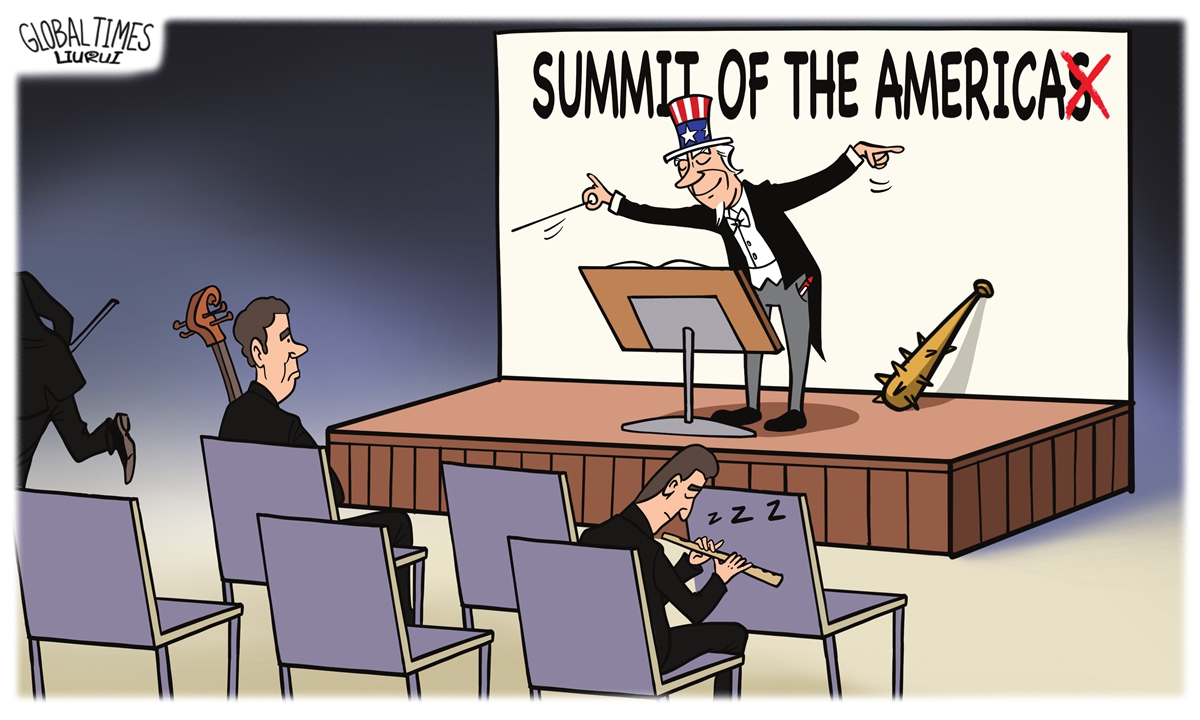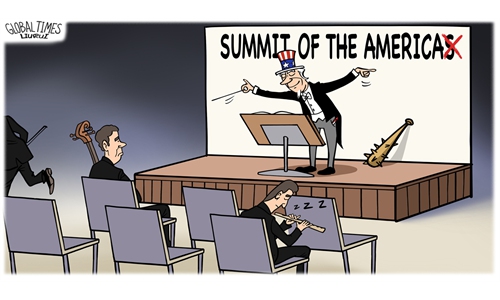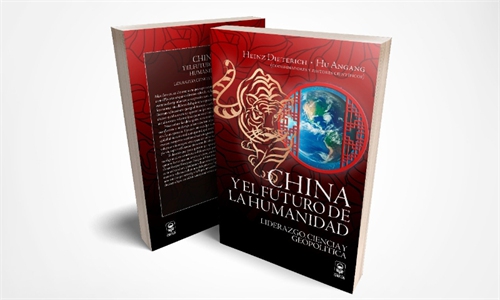Summit of the Americas invokes dark memories of US interventionism in Latin America

Illustration: Liu Rui/GT
The Ninth Summit of the Americas has exposed the region's fissures even before it began. The meeting has revealed deep tensions in the relationship between the US and Latin American countries just when President Joe Biden seeks to restore Washington's historical hegemony in the region. The tip of the iceberg has been the list of invited countries. The US government excluded Cuba, Venezuela, and Nicaragua, arguing that they are not examples of "democratic governance."Several leaders, including Mexican President Andrés Manuel López Obrador, turned down the chance to meet with Biden in Los Angeles. The Mexican president said policies of "exclusion" that had been imposed "for centuries" needed to change, criticizing an unjustified desire for "domination."
The response of the Mexican president reflects a growing discomfort in the region, whose roots date back to decades of US interventionism in Latin America. From the beginning of its independence, the US considered Latin America as a natural area of influence. The history of intervention began in Haiti. At the beginning of the 20th century, invading the novel Caribbean country, according to the US authorities, was a civilizing mission to put an end to "anarchy, savagery, and oppression."
Another measly example is the economic, commercial, and financial blockade against Cuba, an act of war in times of peace imposed unilaterally by the US. This blockade has evolved and hardened over more than 60 years. It began with the cancellation of the Cuban sugar quota in the US market in 1960. Since 1962, president John F. Kennedy completely prohibited the import of goods of Cuban origin. Subsequently, the US has added other prohibitions.
Another example in 1973, Chile saw the US intervene in the overthrow of the democratically elected president Salvador Allende.
Echoes of similar stories during the 20th century resonate in many Latin American countries like Brazil, Uruguay, Colombia, and Argentina. In Guatemala, three direct armed interventions by the US were recorded in the 20th century. The first of these intrusions happened when military troops carried out actions for two weeks against trade unionists. Just after the Cold War, Washington's first action in the region was the invasion of Panama under the guise of the fight against drug trafficking. The search for hemispheric economic integration under US aegis and the battle against the cartel's drugs was the pretext to intervene in Latin America in the coming years.
Mexico has not been an exception regarding the unequal treatment by the US government. Mexico lost half of its territory in the 19th century due to a war against the US in 1847. Consequently, Mexico lost two million square kilometers. In 1913, Ambassador Henry L. Wilson incited a military rebellion against the democratically elected government of Francisco I. Madero. In the following years, US troops invaded Mexican territory during the chaotic period of the Mexican Revolution.
These terrible episodes are not part of a story outgrown. The interference of the North American government in Latin American countries is still present. In recent times, during the Trump administration, Mexico was conditioned to change its immigration policy to retain Central American migrants in its territory under the threat that if Mexico disagreed, then the US government would apply a 25 percent tariff to Mexican exports. Therefore, Mexican government sent 25,000 members of the National Guard to block the migratory flow. Only a couple of weeks ago, former president Donald Trump affirmed that he threatened Mexican president to accept US demands implying that he "never saw someone bend like that." Although with a different style, the current administration of President Biden continues to pressure the Mexican government in many aspects, including on the migration issue.
The Summit of the Americas has demonstrated huge differences between Washington and a significant bloc of countries from the rest of the continent. However, only a multilateral approach can solve the severe problems that shake the Latin American region. Only a genuine dialogue based on the principle of sovereignty and non-intervention can create a consensus to establish a new era in the US-Latin America relationship. It is the way to build an authentic space to solve common problems. As long as interventionism continues, possible progress made at the meeting will be ephemeral. Sadly, the summit will be just a handful of good intentions.
The author is a professor at Tecnologico de Monterrey, Mexico. opinion@globaltimes.com.cn



